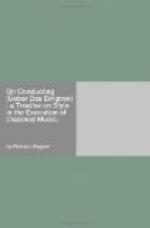I remembered it well, when I came to lead the orchestra of the Philharmonic Society in London, 1855. Mendelssohn had conducted the concerts during several seasons, and the tradition of his readings was carefully preserved. It appears likely that the habits and peculiarities of the Philharmonic Society suggested to Mendelssohn his favourite style of performance (Vortragsweise)— certainly it was admirably adapted to meet their wants. An unusual amount of instrumental music is consumed at these concerts; but, as a rule, each piece is rehearsed once only. Thus in many instances, I could not avoid letting the orchestra follow its traditions, and so I became acquainted with a style of performance which called up a lively recollection of Mendelssohn’s remarks.
The music gushed forth like water from a fountain; there was no arresting it, and every Allegro ended as an undeniable Presto. It was troublesome and difficult to interfere; for when correct tempi and proper modifications of these were taken the defects of style which the flood had carried along or concealed became painfully apparent. The orchestra generally played mezzoforte; no real forte, no real piano was attained. Of course, in important cases I took care to enforce the reading I thought the true one, and to insist upon the right tempo. The excellent musicians did not object to this; on the contrary, they showed themselves sincerely glad of it; the public also approved, but the critics were annoyed and continued so to browbeat the directors of the society that the latter actually requested me to permit the second movement of Mozart’s Symphony in E flat to be played in the flabby and colourless way (ruschlich herunter spielen) they had been accustomed to—and which, they said, even Mendelssohn himself had sanctioned.
The fatal maxims came to the front quite clearly when I was about to rehearse a symphony by a very amiable elderly contrapuntist, Mr. Potter, [Footnote: Cipriani Potter, 1792-1871, pianist and composer, author of “Recollections of Beethoven.” etc.] if I mistake not. The composer approached me in a pleasant way, and asked me to take the Andante rather quickly as he feared it might prove tedious. I assured him that his Andante, no matter how short its duration might be, would inevitably prove tedious if it was played in a vapid and inexpressive manner; whereas if the orchestra could be got to play the very pretty and ingenious theme, as I felt confident he meant it and as I now sang it to him, it would certainly please. Mr. Potter was touched; he agreed, and excused himself, saying that latterly he had not been in the habit of reckoning upon this sort of orchestral playing. In the evening, after the Andante, he joyfully pressed my hand.
I have often been astonished at the singularly slight sense for tempo and execution evinced by leading musicians. I found it impossible, for instance, to communicate to Mendelssohn what I felt to be a perverse piece of negligence with regard to the tempo of the third movement in Beethoven’s Symphony in F major, No. 8. This is one of the instances I have chosen out of many to throw light upon certain dubious aspects of music amongst us.




